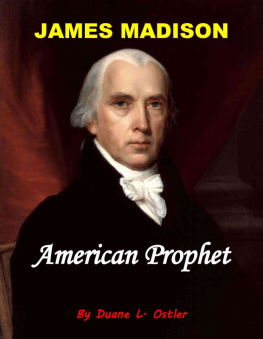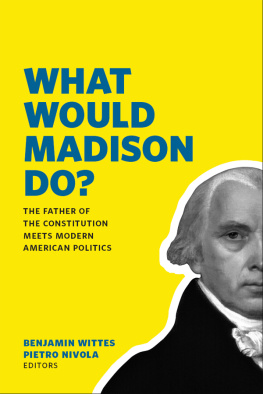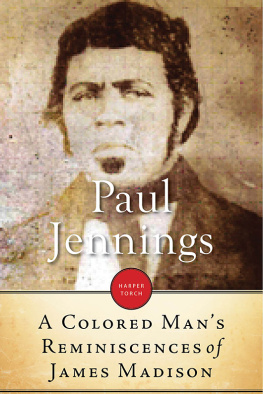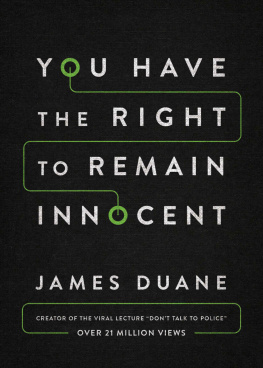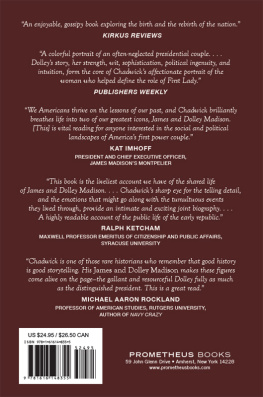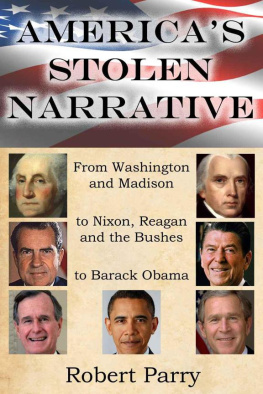JAMES MADISON: AMERICAN PROPHET
Copyright 2014 Duane L. Ostler
This book may not be reproduced, copied ordistributed without the express permission of the author. Eachperson desiring this book should obtain his own copy. Thank you forrespecting the work of this author.
Cover art: "James Madison," by John Vanderlyn,1816.
TABLE OF CONTENTS
James Madison saw ourday. While he had no medium or time machine that allowed him to doit, he nonetheless saw more than 200 years into the future, viewingour conditions and situation, politically and culturally. He sawour turmoil, our political uncertainty and occasional financialchaos, our flirtations with war and uneasy peace, our politicalparty-bashing and Supreme Court activism. And as America'spre-eminent political visionary, he also saw how these problemscould be solved.
But of course, many today don't believe such athing. How could that short little man, dead now for over 175 yearshave any idea of what we face today? Could he have contemplatedEbay sales on the internet, the atomic bomb or modern terrorism?Did he really foresee traffic jams, computer viruses, microwavablenoodles or mind-numbing TV commercials? Did he have any idea thatsatellites would circle the globe, that cell phones might dropcalls while driving a car 75 miles per hour through a canyon, orthat the TSA would perform pat down searches of travelers atairports? How on earth could he have known all that?
Well, of course he didn't know such fine detailsof modern society. Even his wildest nightmares couldn't haveproduced such ideas. And because of this truth, in our modernarrogance we tend to think that somehow means he also lacked anyreal understanding of our political and cultural challengestoday--as if modern technology and the inventions of the last 200years somehow have changed everything in life so much that thereare no common principles or concepts between his time and ours.Viewed this way, his era is separated from ours by a great divide,as if either his generation or ours were an alien race originatingfrom another planet.
But if he really is lost in a fallen andlong-dead era from another world, how can anyone explain suchwonderfully modern, prophetic and pithy statements of his asthese?
"The law does bear fruit, but it is sourfruit."
"A bad cause seldom fails to betray itself."
"All men having power ought to be distrusted toa certain degree."
"The circulation of confidence is better thanthe circulation of money."
Seriously, if a man on the street were to hearthese statements today, he would think they came from a politicaltalk show host on the radio this morning, not from the mind of thefourth president of the United States and 'Father of theConstitution,' now long since deceased - a man who saw our day.
The simple reality is, Madison was a genius. Hisperception of government and how it worked far exceeds that ofalmost everyone today. In the pages that follow we will see hisgenius demonstrated again and again, as we address moderndifficulties with Supreme Court activism, terrorists and war,banking and economic woes, and a host of other problems. It isincredible that this short little man who lived 200 years ago couldhave such an amazing perception of our problems, even after allthese years. But then again, perhaps the reason is that most of ourmodern conundrums (such as abortion, terrorism, the right to die,banking fiascos, drug trafficking, etc., etc.) are not based ontechnology but on morality and common sense. And those are thingshe understood exceptionally well.
Many scholars have tried to criticize Madisonover the years, to bring him down to their level of thinking, tomake him seem like a normal guy who just got lucky by being in theright place at the right time. Such efforts fall flat when a simpleresort to Madison's own words is made. If we stop reading thingswritten about Madison by scholars, and instead start reading whathe wrote, then we will see him in an entirely different light. Thenwe will begin to see his genius, his vision, his incrediblyaccurate perceptions of political reality, and--most important ofall--his counsel on how to extricate ourselves from the messes wehave made for ourselves in this modern era. For he truly saw ourday.
Of course, this acknowledgment condemns the veryvolume you are holding in your hands, since it too falls short ofMadison's brilliant mental powers. What is presented here was onceagain filtered through a modern scholar--me--and is given toreaders piecemeal, spewing the bits and pieces that I, with myweaker mind, have presumed are the most important. I have no doubtthat if Madison had compiled this volume, it would be vastlydifferent. But sadly for us, he is not here and cannot do the jobhimself. And so I make my meager effort, saved if anything by thepresence of Madison's words themselves on these pages--words whichI quote at every opportunity.
Indeed, that is my greatest hope in respect tothis volume - that the things presented here will spark the readerwith a desire to go to the source, to read Madison himself. That iswhere the real jewels of wisdom from this American prophet are tobe found. Only in that way can we avoid the stretched and biasedviews of modern scholars, with all their peculiar notions of whatis most important to present about him. And only in that way can wecompletely discover for ourselves the solutions that he foresaw tothe horrible problems we face in our troubled world today.
Before beginning ourjourney of discovery into the prophetic insights of Madison in ourday, it is helpful to gain some appreciation for just who he was,and what role he played in history. This chapter will provide abrief chronology of the life and times of Madison, and willhopefully make clear why he was chosen to be the subject of thisvolume rather than the other spectacular luminaries of his day suchas Thomas Jefferson, George Washington, Benjamin Franklin or JohnAdams. While author Washington Irving described Madison as a'withered little apple-john,' we will soon see that such adescription is the exact opposite of the truth.
Madison was born on March 16, 1751 at KingGeorge County, Virginia. Young James was the oldest of twelvechildren and took the name of his father, thereby becoming JamesMadison, Jr. At age eleven he began attending a school seventymiles from his home run by Scotsman Donald Robertson. Madisonstudied under Robertson for five years, far surpassing the schoolyouth of today by learning Latin and Greek, as well as a smatteringof French and Spanish (all with a Scottish brogue, of course, dueto his teacher), in addition to mathematics and history. Afterthis, he returned home where he was tutored by the Reverend ThomasMartin, a recent graduate of Princeton in New Jersey. Martinultimately convinced Madison's family that the boy should attendcollege at Princeton under its new president John Witherspoon,rather than going to William and Mary College in nearbyWilliamsburg. When Madison departed for Princeton at the age ofeighteen to start college, he was already "better educated thanmany a present-day holder of a baccalaureate degree."[1]
At Princeton, Madison applied himself sodiligently and single-mindedly to his work that he completed hisfour year degree in two years. He then stayed on for an additionalsix months to study Hebrew and law. Madison apparently thought thathe might become a practicing attorney. However, he soon made thediscovery that law was not particularly satisfying. He laterreferred to the study of law as "coarse and dry," and further saidthat leaving worthwhile pursuits to study law "is like leaving apleasant and flourishing field for a barren desert; perhaps Ishould not say barren either, because the law does bear fruit, butit is sour fruit."[2]
All too soon, Madison's education at Princetonand tutelage under John Witherspoon was over. Benjamin Rush, signerof the Declaration of Independence, said of Madison's time atPrinceton that "[h]is only relaxation from study consisted inwalking and conversation. Such was the character he acquired whileat college, that Dr. Witherspoon said of him to Mr. Jefferson (fromwhom I received the anecdote) that during the whole time he wasunder his tuition he never knew him to do nor to say an improperthing."[3]
Next page
